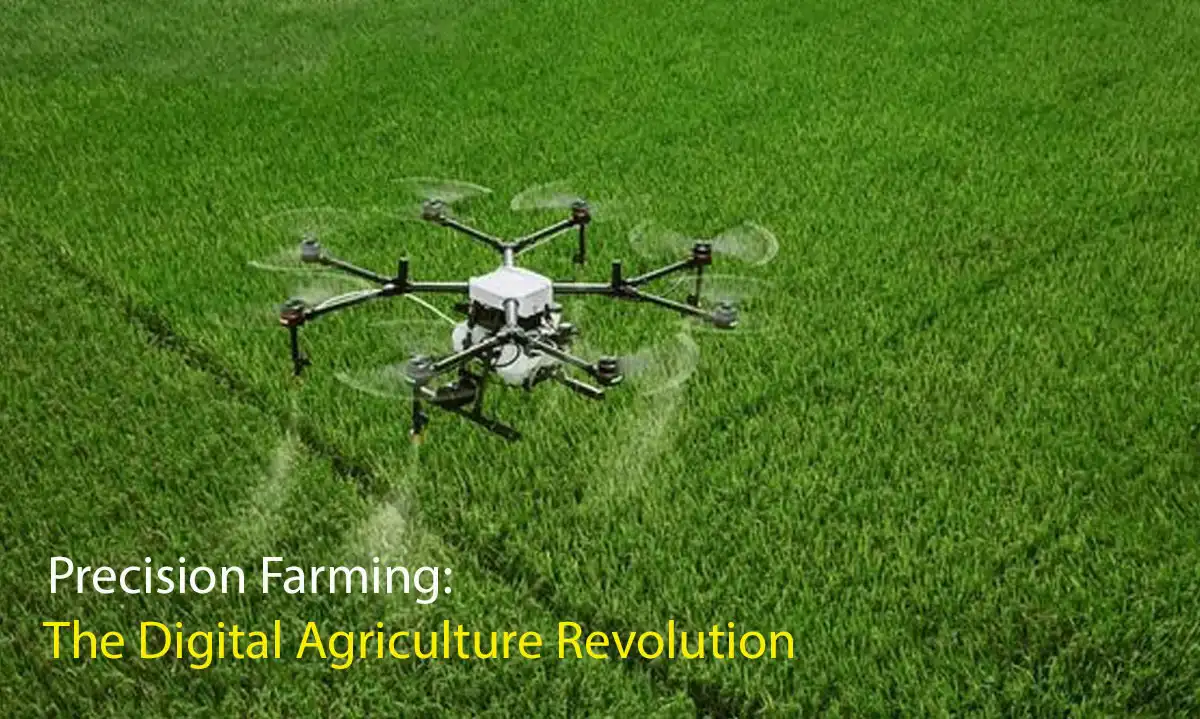Precision Farming: The Digital Agriculture Revolution

Agriculture is a crucial issue in a world where there is an ever-increasing demand for food production: feeding an expanding global population while minimizing environmental consequences and maximizing resource use. Precision farming, commonly referred to as precision agriculture or smart farming, is one novel approach that shows significant promise. By utilizing cutting-edge technologies and data-driven strategies, precision farming is transforming the way we cultivate crops and manage livestock. This blog article will explain what precision farming is, go over the technologies that support it, go over all of its advantages, and explain why Indian farmers ought to think about adopting this revolutionary strategy.
Understanding Precision Agriculture
Precision farming is a kind of agricultural management that makes use of cutting-edge technology to enhance several elements of farming. To make informed decisions about crop production, livestock management, and resource allocation, data must be gathered, analyzed, and used. Farmers may optimize efficiency, production, and sustainability by using this data-driven strategy to customize their operations to particular circumstances.
The Cutting-Edge Technologies
Precision farming relies on an array of cutting-edge technologies, each contributing to its success:
Global Positioning System (GPS): Precision farming is greatly aided by GPS technology, which offers precise location data that enables farmers to precisely map and manage their fields. Accurate planting, fertilizing, and harvesting are all made possible with GPS-guided tractors and equipment. Remote Sensing: Real-time information on soil moisture, nutrient levels, crop health, and insect infestations is provided through drones, satellite and aerial photography, ground-based sensors, and sensors. Farmers can use this information to decide when to use irrigation, fertilizer, and pest control. Variable Rate Technology (VRT): Based on data-driven recommendations, VRT systems modify the application of inputs including fertilizers, herbicides, and water. By preventing waste and reducing usage, this helps the environment and saves money. IoT and Sensors: Real-time monitoring and control of numerous farming activities is made possible by the Internet of Things (IoT) technology, which connects sensors implanted in machinery and equipment. Data about temperature, humidity, soil conditions, and other variables is gathered by these sensors. Data Analytics and Machine Learning: To produce useful insights, sophisticated algorithms analyze the enormous amounts of data gathered from many sources. Crop yields, disease outbreaks, and the best dates to grow a crop can all be predicted using machine learning algorithms. The Payoffs of Precision Farming: The adoption of precision farming offers numerous advantages, both for farmers and the environment: Increased Efficiency: Precision farming maximizes the use of resources, which lowers input costs and increases yields. With fewer resources, farmers can accomplish more, which eventually boosts their profitability. Environmental Sustainability: It lessens the negative effects on the environment caused by soil erosion, nutrient runoff, and water pollution by avoiding the overuse of pesticides, fertilizers, and water. It advocates for ecologically sound agriculture methods. Improved Crop Quality: Farmers can more efficiently monitor and manage crop health thanks to precision farming. Produce of superior quality results from this, which can fetch a higher price on the market. Risk Mitigation: Farmers can predict and respond to weather-related occurrences, diseases, and other dangers with the aid of data-driven decision-making. This lowers crop losses and guarantees a more consistent income. Conservation of Resources: Effective resource management, such as conserving water and using less energy, helps to ensure that natural resources are used responsibly.Why Indian Farmers Should Embrace Precision Farming
India's agriculture farmlands’ problems are distinctive. Farmers are under tremendous pressure to increase food production while preserving resources due to a big population and limited arable land. Here are some persuasive arguments in favor of precision farming for Indian farmers:
Optimized Land Use: Indian farmers use precision farming to increase the productivity of their small plots of land. They can increase yields without increasing their land holdings by adapting farming techniques to certain situations. Water Scarcity Mitigation: Water scarcity is a serious problem in this part of the world. With the use of precision irrigation technologies, farmers can use water more effectively, cutting down on water waste and maintaining a reliable supply of water for agriculture. Increased Profitability: Small landholdings are a hallmark of Indian agriculture, and many farmers struggle to make ends meet. They may increase yields and lower input costs with precision farming, which will increase profitability. Climate Resilience: With more unpredictable weather patterns due to climate change, Indian agriculture is seriously threatened. Farmers can quickly adjust to shifting conditions and reduce risks associated with climate change thanks to precision farming's data-driven methodology. Environmental Benefits: In India, environmental issues like soil erosion and water pollution can be addressed using precision farming. It helps ensure that farming operations are sustainable over the long run by lowering the use of chemicals and soil erosion.In conclusion, precision farming is more than simply a farming technique; it's a revolutionary strategy that holds the answer to solving some of agriculture's most critical problems. Precision farming offers a route to sustainable and prosperous agriculture in India and beyond with its cutting-edge technologies, data-driven decision-making, and countless advantages. Indian farmers can safeguard their livelihoods while also advancing environmental protection and global food security by embracing this agricultural revolution. It's time for Indian agriculture to embark on this exciting journey toward a more sustainable and fruitful future since the future of farming is clear.
Latest Blog
JOIN OUR COMMUNITY !
Stay connected with Getfarms! Follow us on social media for the latest updates, exclusive offers, and a glimpse into the world of farmhouse living. Join our community today














